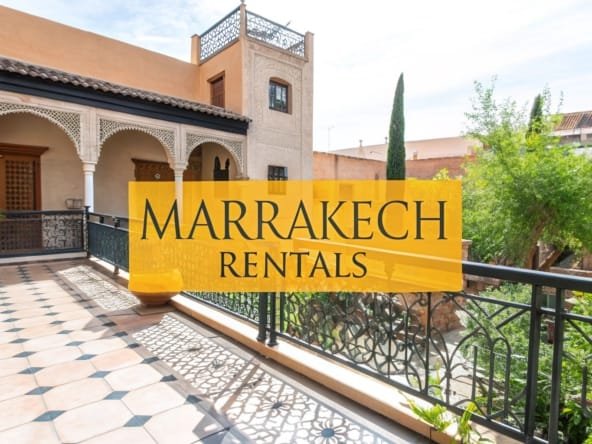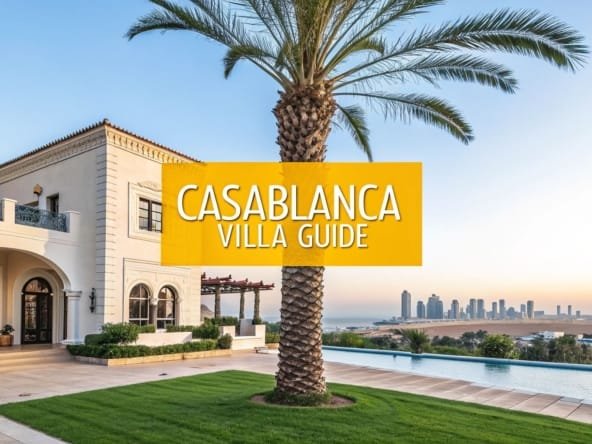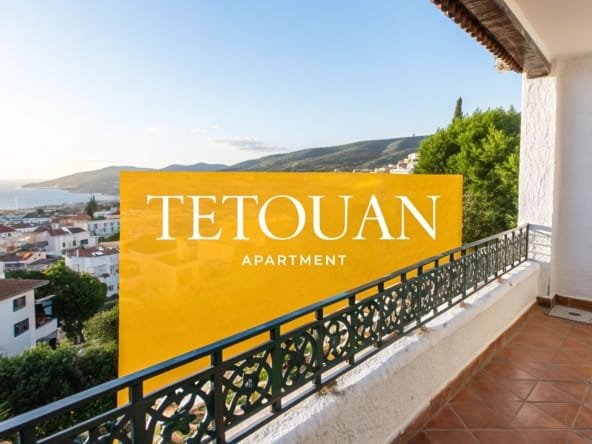Finding the right commercial space is one of the biggest moves your business will make, and in Morocco, that means getting to grips with the local landscape first. Before you even start your search for a commercial property for rent, you need a solid understanding of the lease types, market currents, and the distinct personalities of business hubs like Casablanca versus Marrakech. This knowledge isn't just helpful—it's your foundation for success.
How to Navigate the Moroccan Rental Market
Securing a commercial lease in Morocco isn't a one-size-fits-all process. The journey is coloured by regional differences. Imagine a tech startup hunting for a sleek office in a Casablanca business park; their needs are worlds away from a boutique owner seeking a high-traffic spot in the ancient Marrakech medina. Recognising these nuances from the outset is what separates a smart decision from a costly mistake.
The entire commercial real estate market here operates under specific legal frameworks, primarily the 'bail commercial' or commercial lease. This isn't just any rental agreement; it’s designed with strong protections for the tenant. Critically, it often includes the 'droit au renouvellement', the right to renew your lease, which is a massive advantage for ensuring business stability.
Understanding Key Lease Concepts
The 'bail commercial' is the heart of any commercial tenancy. These leases typically run for three, six, or nine years. But just as important is the concept of 'fonds de commerce'. This represents the business's intangible value—its clientele, reputation, and goodwill—all tied directly to its physical address. This brilliant legal feature means a landlord can't just kick out a thriving business on a whim without facing significant compensation. It protects the sweat equity you pour into building your local presence.
You might also come across the term 'pas-de-porte', which literally translates to "doorstep." Think of it as key money. It's a one-off, upfront payment to the landlord, completely separate from the security deposit, to lock down a lease in a prime, high-demand location. It's not everywhere, but in competitive retail hotspots, it’s a common part of the deal.
Getting these local terms right is non-negotiable. If you misunderstand a concept like 'fonds de commerce', you could make some very expensive assumptions about your rights and financial commitments.
Market Dynamics Across Moroccan Cities
Rental rates and property demand swing wildly from one city to the next. What you get for your money in Casablanca is completely different from what you’ll find in Tangier.
- Casablanca: As Morocco's undisputed economic engine, Casablanca boasts the most mature office market. You can find everything from prestigious spaces in gleaming new towers to practical offices in well-known commercial areas.
- Marrakech: Tourism is the lifeblood here. Prime retail locations in popular districts like Gueliz or the medina are highly sought after and come with premium price tags.
- Tangier: Its strategic position next to the massive Tangier Med port makes it the go-to city for logistics, shipping, and industrial operations. The demand for warehouses and large industrial plots is consistently strong.
- Rabat: Being the capital city, Rabat has a stable, professional-driven market. Office space is steadily in demand from government agencies, NGOs, and service-based firms.
It also pays to look at global trends for context. Even major international markets can experience turbulence. For instance, in early 2025, Boston's office market is facing an 18.5% vacancy rate, and its recovery is predicted to be slow, largely due to the persistence of remote work models. You can see more details on Boston’s commercial real estate situation from Perry CRE. This shows how local and global forces are always at play.
To really get ahead, you'll want to dig deeper. We’ve put together a guide to unlock Morocco’s real estate secrets before it’s too late. Laying this groundwork now will help you build a smart, realistic strategy for finding and securing the perfect spot for your business.
Defining Your Ideal Business Space
Before you even think about scrolling through listings for a commercial property for rent, you need to get crystal clear on what your business actually needs. I've seen too many entrepreneurs waste weeks, even months, chasing properties that were never going to work. Getting this right from the start isn't just a suggestion; it's the most critical part of the process. Think of it as creating a blueprint for your search.
First, let's talk about size. This isn't about guesswork. It’s a practical calculation based on your day-to-day operations. For an office, you need to account for your current team, future growth, private offices, meeting rooms, and maybe a reception area. For a retail business, it's all about maximising your floor space for product displays while ensuring you have enough back-of-house storage. Remember, every listing in Morocco will be in square metres, so do your maths in that unit.
For instance, a growing tech startup with 15 employees might need a 200-square-metre open-plan space with a couple of breakout rooms. A boutique clothing store, however, could thrive in 80 square metres, provided the layout is perfect for customer flow and window displays.
H3: Pinpointing the Perfect Location
In Morocco, location is everything. It's not just a pin on a map; it's a strategic asset that can make or break your business. The right spot depends entirely on your business model. A high-end legal practice absolutely needs to be in a prestigious business district like Anfa in Casablanca, close to its corporate clientele. On the other hand, a logistics company's success hinges on being near major arteries like the A1 motorway or a transport hub like the Tanger Med Port.
When you're scouting areas, ask yourself these questions:
- Can my customers find me easily? Think about foot traffic, parking, and proximity to public transport like the tramway in Rabat or Casablanca.
- Is this a reasonable commute for my team? A location that's a nightmare to get to will hurt your ability to attract and retain top talent.
- How close are my suppliers? If you depend on daily deliveries, being tucked away in a hard-to-reach neighbourhood will create logistical headaches and add costs.
The best commercial zones offer a blend of accessibility and a thriving business ecosystem.
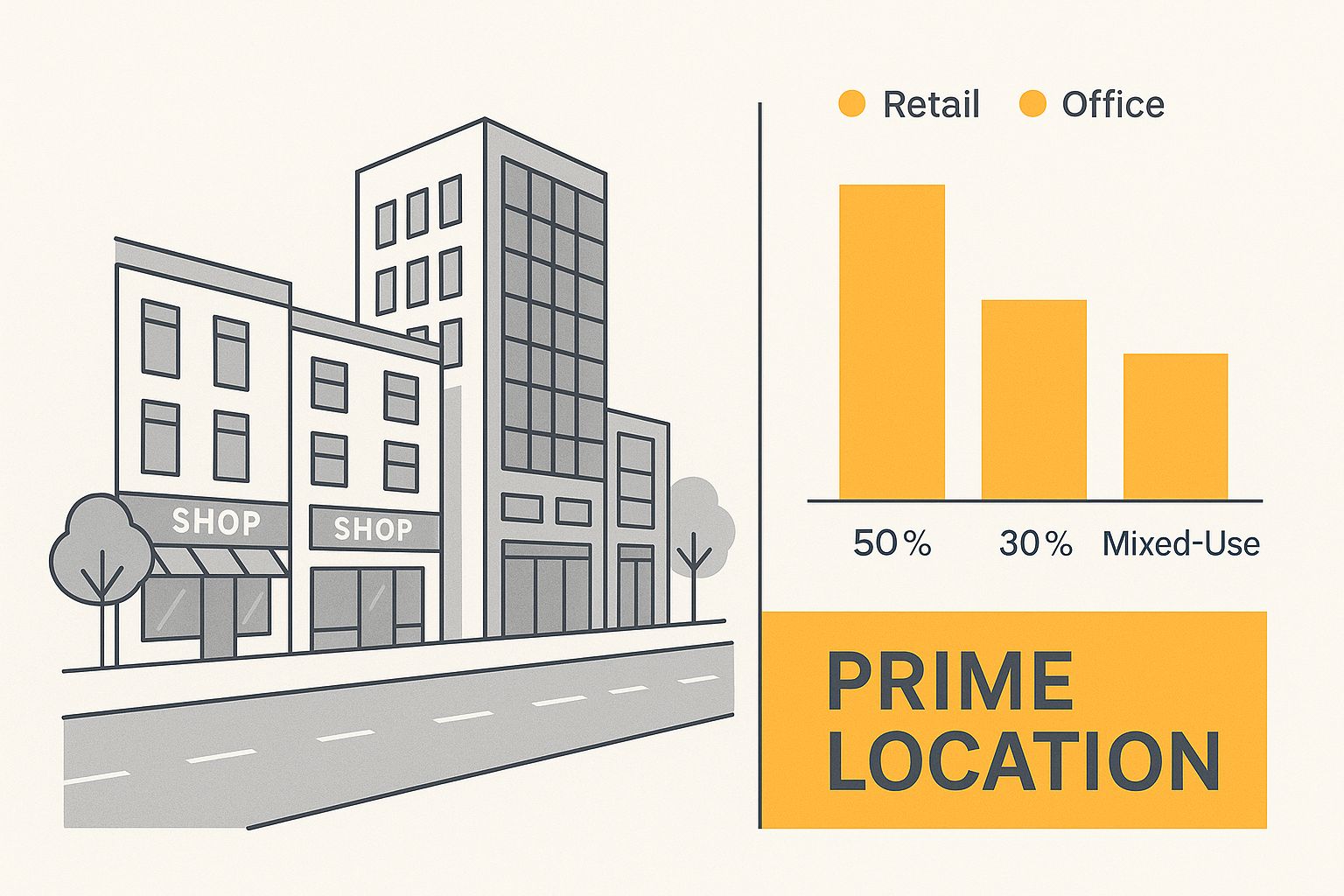
As the image shows, a prime location is more than just a good address. It’s a dynamic hub with high visibility, modern infrastructure, and a strong commercial pulse—all essential ingredients for growth.
Not all commercial properties are created equal, and choosing the right type is fundamental. The table below breaks down which property types are best suited for different business activities in the Moroccan context.
Commercial Property Type Suitability in Morocco
| Property Type | Best For (Business Activities) | Key Considerations (Location, Infrastructure) |
|---|---|---|
| Retail Space (Magasin) | Boutiques, cafés, showrooms, convenience stores, service-based businesses (e.g., travel agency). | High street or mall location for foot traffic. Large display windows are essential. Good visibility and easy access are paramount. |
| Office Space (Bureau) | Tech companies, law firms, consultancies, marketing agencies, administrative headquarters. | Central business districts or dedicated office parks. Needs high-speed internet, sufficient parking, and meeting room facilities. |
| Warehouse (Entrepôt) | Logistics, e-commerce fulfillment, light manufacturing, distribution centres, storage. | Proximity to motorways, ports, or airports is non-negotiable. Requires loading docks, high ceilings, and robust security. |
| Workshop (Atelier) | Artisans, mechanics, small-scale manufacturing, creative studios. | Industrial zones or mixed-use areas. Needs proper ventilation, 3-phase power, and zoning for noise/emissions. |
Understanding this from the outset helps you filter your search and focus only on properties that are genuinely fit for purpose.
Infrastructure and Zoning Essentials
Beyond the address and the square meterage, the bones of the building have to work for you. A digital marketing agency is dead in the water without a reliable fibre optic connection. A restaurant without the right ventilation or gas lines is facing a hugely expensive retrofitting job. Don't gloss over these details.
Your technical checklist should be non-negotiable:
- Confirmed high-speed internet availability
- Sufficient electrical capacity for your equipment
- Adequate parking for both staff and clients
- Modern and efficient heating, ventilation, and air conditioning (HVAC)
- Solid security features, like controlled access and surveillance
Just as crucial are Morocco's local zoning laws, known as the ‘plans d’aménagement’. These plans are the rulebook, dictating exactly what business activities are allowed in a given area or building. You could find a stunning space that ticks every box, but if it's zoned strictly for residential use, you simply cannot legally operate your restaurant or workshop there.
Pro-Tip: Before you get emotionally invested in a property, do your homework. A quick visit or call to the local 'agence urbaine' (urban agency) to verify the zoning for a specific address can save you from major disappointment and wasted effort.
By taking this methodical approach, you ensure that every commercial property for rent you view is a real contender. You move from a scattered, hopeful search to a targeted, strategic mission, focusing only on spaces that will truly serve as a foundation for your business's success.
A Strategic Approach to Finding and Evaluating Properties
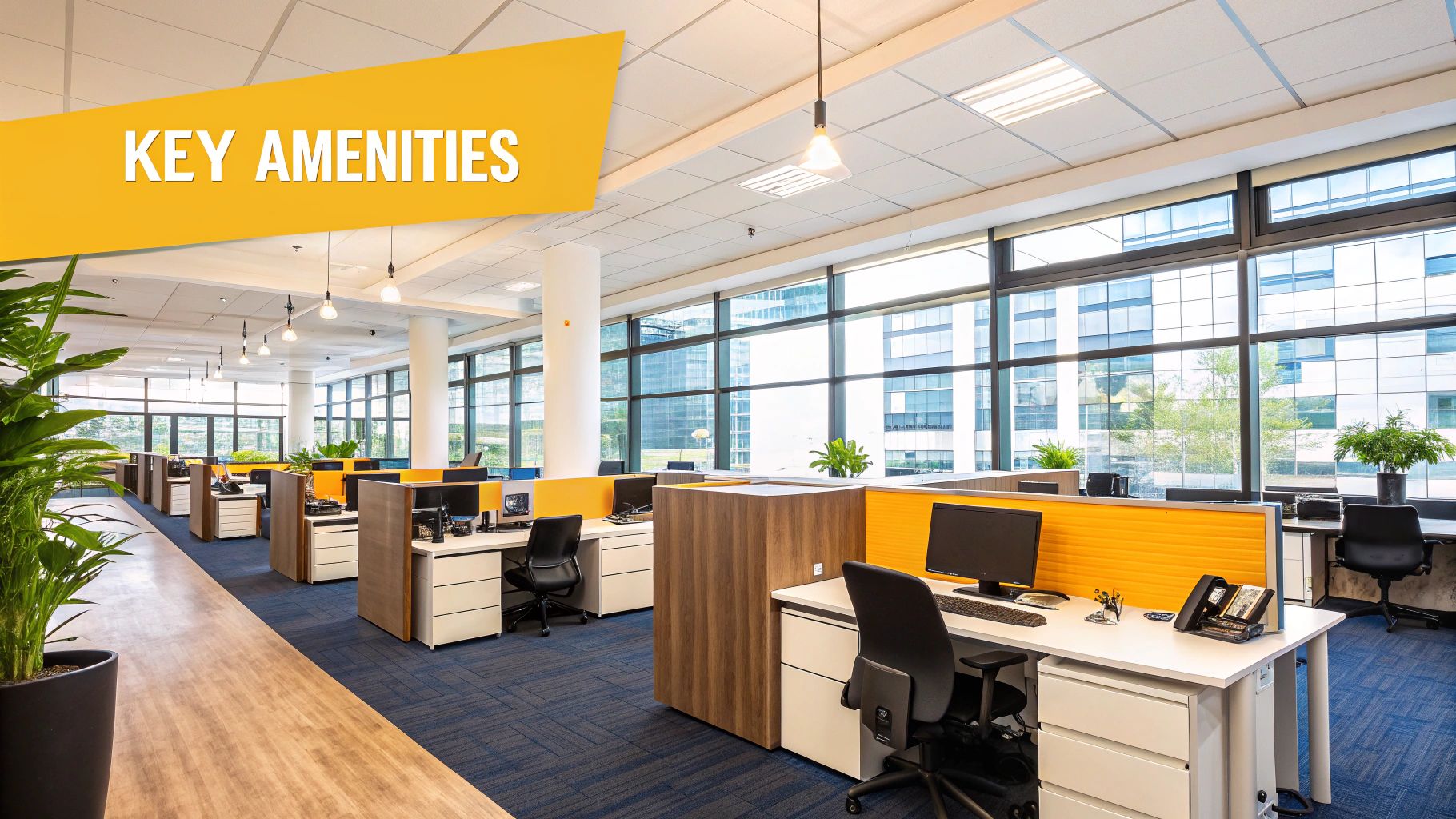
Finding the right commercial property for rent in Morocco is about more than just scrolling through listings. It requires a proper investigative strategy, blending the efficiency of digital tools with the invaluable insights of old-school, on-the-ground legwork.
Your search will likely kick off on online real estate portals, or portails immobiliers. They’re a great way to get a feel for the market and see what’s publicly available across different cities. But the real gems, the properties that give you a competitive edge, often aren't advertised.
This is where a professional agent immobilier becomes your most critical asset. A well-connected local agent has their ear to the ground, with access to off-market deals and a nuanced understanding of neighbourhood dynamics you just can't find online. They know the up-and-coming districts, the landlords to avoid, and the hidden opportunities that can make all the difference.
Mastering the Site Visit
Once your agent helps you build a shortlist, it's time to put on your detective hat. The site visit is your chance to look beyond a fresh coat of paint and see the property for what it truly is. A thorough inspection is non-negotiable; it’s what stands between a smart investment and a series of costly headaches.
Here’s a practical checklist for what to scrutinise:
- Structural Health: Scan ceilings and walls for any hint of water damage. Look for cracks in the foundation. If you can, check the condition of the roof. These are tell-tale signs of potentially expensive, business-disrupting repairs.
- Core Utilities: Don't be shy. Run the taps, flush the toilets, and check the water pressure. Open the electrical panel—does it look modern and capable of handling your equipment's demands? Ask pointed questions about the age and service history of the HVAC system.
- Access & Security: How secure are the entry points? Check the locks, windows, and any existing security systems like cameras or alarms. Is there good lighting in the car park and common areas for staff or clients leaving after dark?
A space can tick all the boxes on paper, only for you to discover it lacks the three-phase power your workshop needs or has a nagging plumbing issue the previous tenant battled for months. Never, ever skip this deep-dive inspection.
Analysing the Surrounding Area
A fantastic property in a failing location is a recipe for disaster. Your business's success is intrinsically linked to its environment, so your due diligence has to extend well beyond the property line.
Start by becoming a local observer. Visit the area at different times of the day and on various days of the week. That bustling street at lunchtime might be a ghost town by 6 PM. Is the neighbourhood safe and well-lit for employees working late? This kind of hands-on research gives you a genuine feel for the location's pulse.
Next, size up the competition. Are there businesses just like yours nearby? That could signal a saturated market, but it could also mean you've found an established commercial hub that naturally attracts your target demographic. Look for complementary businesses, too. A high-end hair salon, for instance, could do brilliantly next to a luxury fashion boutique. For a closer look at what defines a prime commercial area, our analysis of the Marrakech luxury property market offers some useful insights.
Finally, think about the future. A quick visit to the local agence urbaine or a check of municipal plans online can reveal upcoming developments. A new tram stop, public park, or major residential project could be a massive boon for your business. On the flip side, discovering that major road construction is planned for the next two years could save you from a logistical nightmare. This forward-looking analysis ensures the location you choose today remains a strategic asset for years to come.
Decoding the Moroccan Commercial Lease Agreement
When you're ready to sign a Moroccan commercial lease, known as a 'Bail Commercial', you've reached a pivotal moment. This isn’t just a formality; it's the legal bedrock of your business's physical presence. This document will dictate your operational reality and financial commitments for years to come.
Overlooking a single clause can create headaches you never anticipated, from surprise costs to limitations on how you can run your business. The best approach is to treat this document with the seriousness it deserves. Let's break down what you need to know before you sign.
Key Components of the Lease Agreement
Every 'Bail Commercial' is built on a few core pillars. Once you understand them, you'll be able to read any lease with confidence, spot potential issues, and know where you have room to negotiate.
First, there’s the lease term, or 'durée du bail'. In Morocco, you'll almost always encounter the classic "3-6-9" year structure. This gives both you and the landlord a predictable framework. A longer term means more stability, which is great for an established business. A shorter term offers flexibility, perfect if you're a startup expecting rapid growth. You need to decide which aligns with your five-year plan.
Next up is the rent, or 'loyer'. It seems simple, but the devil is in the details. Is the rent fixed for the entire lease? Or is there an annual escalation clause? If it increases, you need to know how it's calculated. A fixed percentage is predictable, but one tied to a fluctuating index could be a gamble.
Finally, you have the 'droit au renouvellement'—your right to renew the lease. This is a powerful piece of Moroccan commercial law designed to protect tenants. It essentially gives you the right to stay put and renew your lease under similar terms, preventing a landlord from kicking you out simply because they got a better offer.
The Power of 'Fonds de Commerce'
Here’s a concept that’s vital to understand because it’s unique to Morocco and other civil law countries: the 'fonds de commerce'. This isn't just legalese; it's the official recognition of all the value you create that is tied directly to your business location.
Think about it. After years of operating, your address becomes part of your brand. Customers know where to find you. You've built goodwill and a reputation in that specific spot. The 'fonds de commerce' represents these intangible assets, and Moroccan law protects your investment in them.
If a landlord refuses to renew your lease without a very good reason (like you haven't paid rent or you've made unapproved alterations), they can't just show you the door. They may be legally required to pay you significant compensation, called an 'indemnité d'éviction', for the loss of your 'fonds de commerce'.
This legal protection is one of the biggest advantages for commercial tenants in Morocco. It means you can invest in your space, build your client base, and grow your brand with the confidence that your hard-earned value is legally recognised.
Understanding Tenant and Landlord Obligations
A lease agreement is a partnership, with clear duties for both you and the landlord. Knowing exactly what's expected of you—and what you can demand from them—is non-negotiable.
Your responsibilities as the tenant typically include:
- Routine Maintenance: Things like minor interior repairs and general upkeep to keep the space looking professional.
- Timely Rent and Charges: This is fundamental. Late payments are the quickest way to find yourself in breach of the contract.
- Agreed-Upon Use: The lease will state what kind of business you can operate. You can't lease a space for a consulting firm and then open a café without the landlord's explicit, written permission.
The landlord is generally on the hook for:
- Major Structural Repairs: The big stuff—the roof, foundations, exterior walls, and main building systems.
- Ensuring 'Jouissance Paisible': This literally translates to "peaceful enjoyment." The landlord must guarantee you can run your business without being unreasonably disturbed.
The details of who pays for what, especially for grey areas like property taxes or major HVAC upgrades, are often where negotiations happen. Never make assumptions. For instance, I once saw a client successfully negotiate for the landlord to cover a complete electrical system upgrade by framing it as a long-term value addition to the property itself. Getting these points clarified in writing before you sign can save you thousands of dirhams down the road.
Financial Planning And Effective Negotiation Tactics

Finding the right commercial space is one thing; securing it on favourable terms is another challenge entirely. The monthly rent is just the tip of the iceberg. A smart financial plan and a solid negotiation strategy are what separate a good deal from a great one—and protect your business's cash flow from the very beginning.
Let's be clear: before you even think about making an offer, you need a complete and honest picture of your upfront financial commitments. In Morocco, this goes far beyond just the first month's rent, and getting blindsided by unexpected costs is a rookie mistake you can’t afford to make.
Budgeting For All Upfront Costs
Your largest initial outlay will almost certainly be the security deposit, known locally as the 'dépôt de garantie'. Landlords typically demand the equivalent of two or even three months' rent as a guarantee against potential damages. This is a significant sum, so you need to have it liquid and ready to go.
Next, if you've wisely engaged a real estate agent (agent immobilier), their commission is another immediate expense. The standard fee is usually one month's rent plus VAT. Think of this not as a cost, but as an investment in their market knowledge and negotiation support.
In high-demand commercial districts, you'll likely encounter a uniquely Moroccan component: the 'pas-de-porte'. This is a non-refundable, one-time payment made directly to the landlord to secure the keys. It’s essentially "key money," reflecting the prime value of the location. While often a hefty figure, it can be a point of negotiation.
Expert Tip: Your initial budget must have separate lines for the first month's rent, a 2-3 month security deposit, agent fees, and a potential 'pas-de-porte'. Overlooking any one of these can immediately put your ideal property out of reach.
Crafting A Winning Negotiation Strategy
With your finances properly mapped out, it’s time to shift your focus to negotiation. The asking price is almost always a starting point, not a final number. A professional, well-prepared approach here can save you a substantial amount of money over the full term of your lease.
A fantastic tactic I've seen work time and again is requesting a rent-free period, or 'franchise de loyer', to cover your fit-out. If the space needs work—new partitions, painting, specific electrical installations—it's perfectly reasonable to ask for one to three months without rent.
You're not asking for a handout. Frame it as a mutual benefit: you're investing your own capital to improve the long-term value of their asset.
Here are a few other critical points to bring to the negotiating table:
- Cap Annual Rent Increases: Don't accept a vague escalation clause. Push for a fixed annual increase, like 2-3%, or tie it to a predictable government index. This gives you budget certainty.
- Clarify Maintenance Responsibilities: Get specific. Your goal is to have the landlord responsible for all major structural elements, plumbing, and electrical systems, while you handle cosmetic and minor upkeep.
- Negotiate Lease Flexibility: For a newer business, a break clause can be a lifesaver. This allows you to terminate the lease early under specific, pre-agreed conditions, giving you a crucial safety net if things don't go as planned.
Your leverage in any negotiation comes from being perceived as the ideal tenant: professional, financially sound, and committed to a long-term, stable tenancy. Back up your offer with a concise business plan and clean financial statements to build that crucial trust.
For a broader perspective on the market, take a look at our insights on why Morocco’s real estate is worth your attention. By planning diligently and negotiating with confidence, you can secure a commercial lease that doesn't just house your business, but actively supports its growth.
Here is the rewritten section, crafted to sound like an experienced human expert:
Your Top Questions About Commercial Rentals in Morocco, Answered
If you’re looking to rent a commercial space in Morocco, you’ve probably got a few questions. The market has its own quirks and legal norms, and getting clear answers from the start is the best way to move forward with confidence. Let's break down some of the most common things prospective tenants want to know.
What’s the Deal with ‘Fonds de Commerce’?
This is a big one, and it's fantastic news for tenants. The 'fonds de commerce' is a powerful legal concept in Morocco that protects your business. Think of it as the total value you build in a specific location—your customer base, your brand recognition, your goodwill. It’s all tied to that physical address.
Because the law recognises this, a landlord can't just kick you out or refuse to renew your lease on a whim. If they want to end the agreement without a legally sound reason, they often have to pay you significant compensation. It’s a safety net for the investment you’ve poured into your business’s location.
Are the Lease Terms Set in Stone?
Not at all. While there's a legal framework, almost every key part of a commercial lease is up for negotiation. I've seen clients successfully negotiate everything from the monthly rent and caps on annual increases to securing a generous rent-free period to handle fit-outs.
Don't forget the smaller details, either. Things like who is responsible for major versus minor repairs can, and should, be discussed. A strong application and a bit of savvy negotiation can lead to a much better deal.
Remember, an empty property isn't making the landlord any money. A serious, long-term tenant is a valuable asset, so don't be afraid to make a reasonable offer. Your first proposal is just the beginning of the conversation.
What Should I Budget for Upfront?
Good question. It's more than just the first month's rent. You'll need to prepare for a few key expenses right out of the gate. First is the security deposit, or 'dépôt de garantie', which is usually the equivalent of two or three months’ rent.
If you’ve worked with an estate agent to find the space, their fee is typically one month's rent. And in some high-demand areas, you might also encounter a 'pas-de-porte'—a one-off, non-refundable payment to the landlord to secure a prime location. Be sure to factor all of this into your initial budget.
Navigating Morocco's property market requires local knowledge and a steady hand. Rich Lion Properties specialises in guiding clients through every step, ensuring the entire process is clear and straightforward. Find your ideal commercial space with an expert in your corner by visiting us at https://richlionproperties.com.

